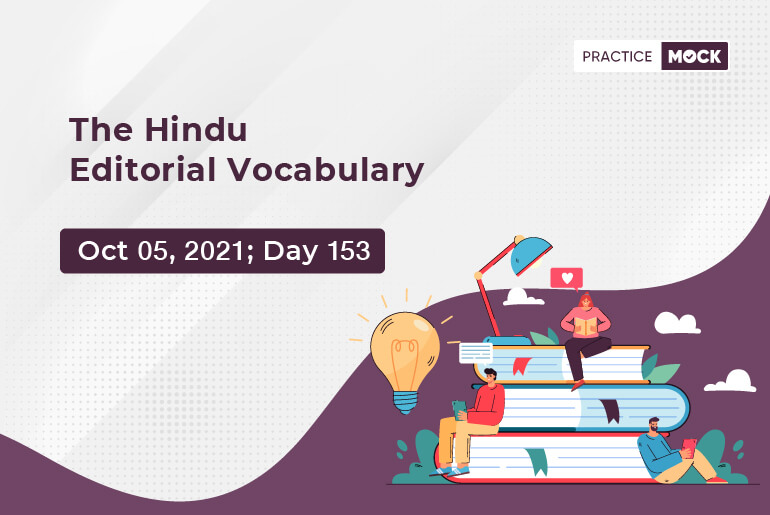| Difficult Word/ Phrase | Contextual Sense |
| Deficit | a lack or impairment in an ability |
| Mow down | to kill or knock down (a person or many people) in a sudden and violent way |
| Convoy | A procession of land vehicles travelling together |
| Agitator | a person who tries to persuade people to take part in political protest |
| Rapprochement | The reestablishing of cordial relations |
| Headway | Forward movement |
| Abeyance | a state of temporary disuse or suspension |
| Budge | Move very slightly |
| Maximalist | (especially in politics) a person who holds extreme views and is not prepared to compromise |
| Prone | Having a tendency (to) |

Needless escalation: On Lakhimpur Kheri violence
Violence in Lakhimpur Kheri will increase trust deficit (a lack or impairment in an ability) between farmers and Government
The deaths of eight people, four of whom were mowed down (to kill or knock down (a person or many people) in a sudden and violent way) by a vehicle that was part of the convoy (A procession of land vehicles travelling together) of Union Minister of State for Home Affairs and BJP MP Ajay Kumar Mishra, in Lakhimpur Kheri in north-central Uttar Pradesh, marks an escalation of violence in a movement that has tried to remain peaceful. While the agitators (a person who tries to persuade people to take part in political protest) and the BJP have traded charges on who is responsible, the incident has also worsened chances of a rapprochement (The reestablishing of cordial relations) between the farmers protesting against farm laws introduced last year and the Union government. There has been little headway (Forward movement) since January this year, when the Government agreed to a few demands and also promised to keep the farm laws in abeyance (a state of temporary disuse or suspension), and after the Supreme Court stayed their implementation. But the distrust between the unions representing the agitators and the Government has remained high, with the farmers refusing to budge (Move very slightly) from their maximalist ((especially in politics) a person who holds extreme views and is not prepared to compromise) position seeking a repeal of the three laws passed last year — the Farmers’ Produce Trade and Commerce (Promotion and Facilitation) Act, Farmers (Empowerment and Protection) Agreement on Price Assurance and Farm Services Act, and the Essential Commodities (Amendment) Act.
The farmers are also willing to continue the protest indefinitely, with its intensity increasing after the harvest season even as their methods have come to the unfavourable notice of Supreme Court judges. A Court-appointed committee to facilitate dialogue with the farmers submitted its report on the laws in March but it is yet to be made public. The experience of the economic reforms since 1991 has shown that rushing them through without political consensus — even if they have merits — by ignoring crucial stakeholders creates severe discontent. Farming in much of India has largely been dependent upon State subsidies, procurement and support pricing — and any sudden change in these inputs may jolt the sector, which has been prone (Having a tendency (to) to crises in the last few decades, even if the Government claims that liberalising the farm sector will enhance agricultural incomes. It is true that the protesting farmer unions are concentrated in Punjab, Haryana and western U.P., where the involvement of the State in agricultural procurement, awareness of minimum support prices and the presence of mandis is more robust. But it is also true that institutional redress mechanisms to take into account farmers’ concerns have not been put in place. After all, the laws were passed without sufficient deliberation through parliamentary committees and public hearings even as the Bills were rushed, by voice votes, in the Upper House of Parliament. This, no doubt, is the reason for the lingering trust deficit. The U.P. government must impartially investigate the incident in Lakhimpur Kheri but it is also imperative for the BJP-led Union government to restore mechanisms of procedural democracy to bridge the trust deficit. Restarting talks with the unions will be a good beginning.

Want to improve your vocabulary further? Download the Lists of Word-Meanings of Previous Months here.
- Sign Up on Practicemock for Updated Current Affairs, Free Topic Tests and Free Mini Mocks
- Sign Up Here to Download Free Study Material
Free Mock Tests for the Upcoming Exams
- RRB PO 2024 Free Mock Test
- RRB Clerk 2024 Free Mock Test
- SSC MTS Free Mock Test
- SSC CHSL Free Mock Test
- SSC CGL Free Mock Test
- GATE Mechanical Free Mock Test
- GATE Civil Free Mock Test
- NABARD Gr. A Free Mock Test
- SBI Clerk Mains Free Mock Test
- SSC CPO Free Mock Test
- AFCAT Free Mock Test
- CAT Free Mock Test
- NIACL Assistant Free Mock Test
- UIIC AO Free Mock Test
- UIIC Assistant Free Mock Test
- GIC Assistant Manager Free Mock Test
- NICL AO Free Mock Test
- Free SSC Live Test
- UPSC CSAT Free Mock Test
- CDS-I Free Mock Test
- RRB ALP Free Mock Test


